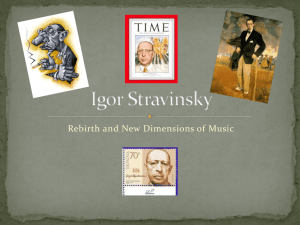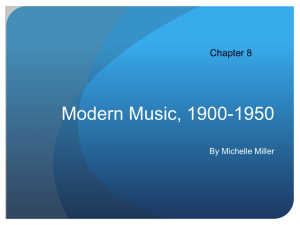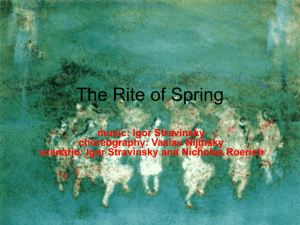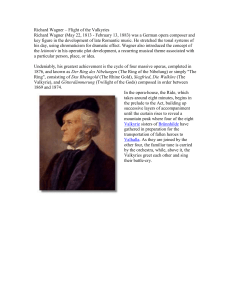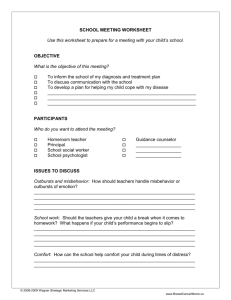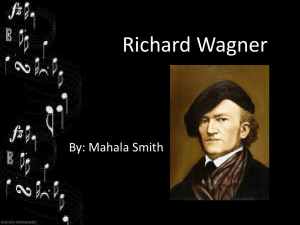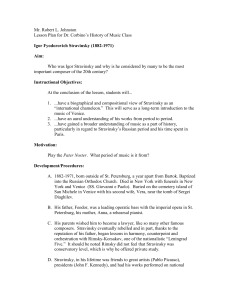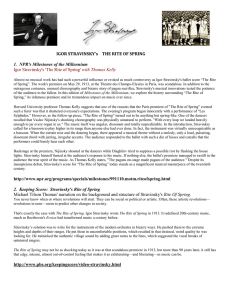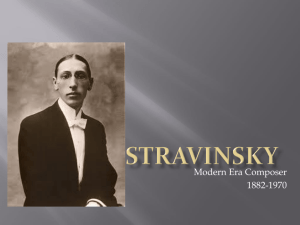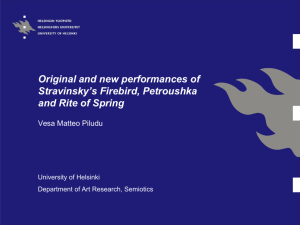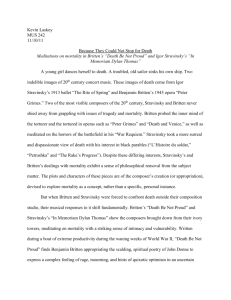music project 2
advertisement
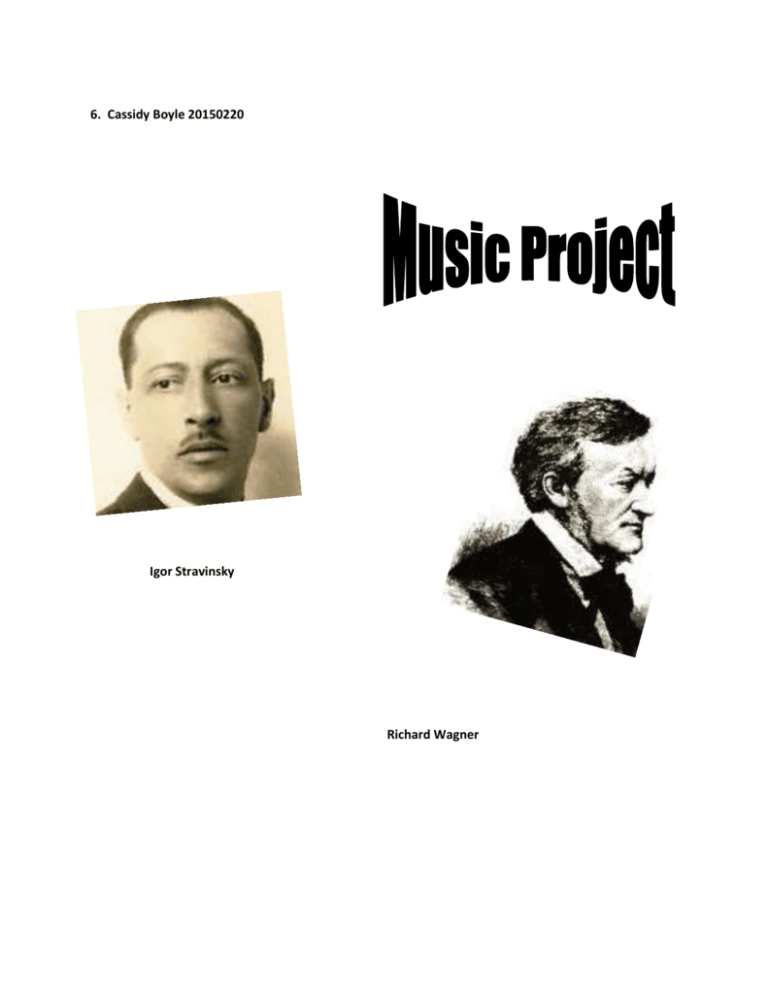
6. Cassidy Boyle 20150220 Igor Stravinsky Richard Wagner Igor Stravinsky On June 17th, 1882, Igor Fedorovich Stravinsky was born at Oranienbaum near St. Petersburg, Russia. His father was a star singer at the Imperial Opera, but he wanted his son to be a bureaucrat. Before he made the decision to become a musician, Igor finished a law course at a university. By this time, Igor managed to be an amateur pianist, a professional accompanist, a reader of avant-garde scores from France and Germany, and a connoisseur of Italian, French, and Russian opera. Igor’s best friend was Stephan Mitusov, the stepson of a prince. Mitusov translated poems from French and Stravinsky set them to music in 1910. One of Stravinsky’s classmates was son of a composer, so he was lucky and received an internship. Sergei Diaghilev, a great sponsor of entertainment, invited him to go to Paris, France, to write orchestral pieces that he was producing. The ballets were also unique and quickly became classics. The three ballets, “Firebird,” “Petrushka,” and “The Rite of Spring,” made Stravinsky's influence in the arts well known. Because of war, Igor had trouble leaving Paris. During this time, he lived in Switzerland, where he collaborated with the poet C. F. Ramuz. These collaborations included, “The Soldier's Tale.” This work deeply influenced Bertolt Brecht, Jean Cocteau, and other dramatists of the 1920s. A short comic opera, “Mavra,” revealed a new lyricism in Stravinsky's complicated development. Even though it wasn’t that popular, it influenced young composers. Stravinsky had many, many more popular works too, from 1942 to 1948 Stravinsky worked on and off on a setting of the Ordinary of the Roman Catholic Mass for chorus. He had been pushed to do this work by Mozart's Masses but not in any obvious way. When Stravinsky settled in the United States in 1939, he renewed his interest in popular music. He composed several short pieces, including “Ebony Concerto” for Woody Herman's band. His arrangement of the "Star-Spangled Banner" was too severe to become a favorite. Several projects for film music were begun but none were completed. Stravinsky's works of the 1960s continued to demonstrate complex rhythms and sounds, as well as fascinating harmony and counterpoint. Stravinsky died on April 6, 1971, in New York City and he was buried in Venice. His approach to musical composition was one we will always use for renewal. Rhythm was the most important factor, and his rhythms were widely imitated. His instrumentation and his ways of writing for voices were distinctive and influential. His harmonies and forms were difficult to grasp, though, but his melody was the most essential of the elements. Richard Wagner The German composer, Richard Wagner, was one of the most important figures of nineteenth-century music. He was also a crucial figure in nineteenth-century cultural history for his criticism, or writing beliefs. He was born on May 22, 1813, in Leipzig, Germany, into a middle-class family. He had eight siblings and his father, Friedrich, died shortly after Richard's birth. Within the year, his mother Johanna married Ludwig Geyer. When he was younger, Wagner showed little talent or interest in anything except for writing poetry. Wagner's musical training wasn’t given into until he was eighteen, when he studied with Theodor Weinlig in Leipzig, Germany, for a year. He began his career in 1833 as choral director in Würzburg and composed his early works in imitation of German romantic compositions. Ludwig van Beethoven was his major idol at this time, like Taylor Swift or Justin Bieber would be today. Wagner wrote his first opera, Die Feen, translated to “The Fairies,” in 1833, but it wasn’t produced until after the composer's death. He was music director of a theater in Magdeburg from 1834 to 1836. That year he married Minna Planner, a singer/actress who was active in local theatrical life. In 1837 Wagner became the first music director of the theater in Riga, Russia, where he remained until around 1839. He then set out for Paris, France, where he hoped to make his fortune. While in Paris, he developed a hatred for French musical culture that lasted the remainder of his life, regardless of how often he attempted to have a Parisian success. It was at this time that Wagner, in financial desperation, sold the scenario for Der fliegende Holländer , or “The Flying Dutchman” to the Paris Opéra for use by another composer. Wagner later set to music another version of this story. Turmoil was going on in Germany at this time, so he settled in Switzerland. Wagner died on February 13, 1883, in Venice, Italy, and was buried at Bayreuth. WORKS CITED: Igor Stravinsky http://www.notablebiographies.com/St-Tr/Stravinsky-Igor.html Richard Wagner: http://www.notablebiographies.com/Tu-We/Wagner-Richard.html#b
